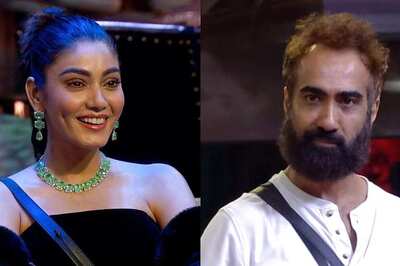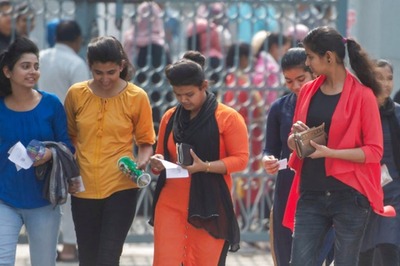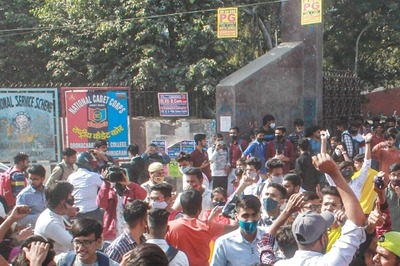
views
Anuradha SenGupta: Smriti why did you shop on a busy day which is going to start at 8 and go on till atleast 11? Why would you take time out to shop vegetables? I wouldn’t do it.
Smriti Irani: It is a part and parcel of my daily life, my routine. I am extremely finicky about my household chores, I would possibly leave only one item for my maid to go and fetch from the market.
Anuradha SenGupta: Smriti, you live in Lokhandwala, this is where the call and the five rupee worth of Dhania patta comes to your doorstep.
Smriti Irani: Lokhandwala, because of the real estate prices also has a steep price when it comes to the veggies. I think it is a very middle class habit that you will haggle for your Dhania - nahin main teen rupaiya doongi (No, I will give only three rupees.)
 Anuradha SenGupta:You are the typical Bombay success story, isn't it? Most of the people know how you came here with little or no money. You borrowed from your dad, you worked at McDonald's and today you are the face of Indian television, isn't it? Do you think that we all contribute to the myth that 'Bombay is the city of dreams'? Is it really the 'city of dreams'?
Anuradha SenGupta:You are the typical Bombay success story, isn't it? Most of the people know how you came here with little or no money. You borrowed from your dad, you worked at McDonald's and today you are the face of Indian television, isn't it? Do you think that we all contribute to the myth that 'Bombay is the city of dreams'? Is it really the 'city of dreams'?
Smriti Irani: I feel it is the 'city of possibility' more than the 'city of dreams'. If you have the will and if you have the talent, atleast it gives you that one chance to make it. The idea is that you should be ready and alert when the chance happens. For a lot a lot of people I think that opportunities go by. I was actually lucky enough to realise when the opportunity knocked at the door and I opened the door and welcomed it. So, Bombay if it cannot be called the city of dreams, it can atleast be called the city of possibility.
Anuradha SenGupta: You have already reinforced and underlined, your middle class background, the middle class approach to life - picking up sabzi (vegetables), the haggling - why do you need to do this?
Smriti Irani: I need to constantly remind myself where I came from; I don't want to forget that because it is very easy to forget in the whole dazzle and the glamour of my job.
Anuradha SenGupta: Does it tie in with the fact that you want to be a political leader? Do you want to be seen always as a person who is in touch with the middle class?
Smriti Irani: As a human being, as a person, per se. I am not dressed as a politician. I am wearing my jeans and I am wearing my shorts because it is the most convenient thing to dress in when I am running around my kids and fetching my veggies and going to work. But as a person, I need to very deeply stay connected to my roots and what I am as a person. It is very easy to get caught up. The minute I land now, there will be 20 people who will stand up to say 'Good Morning'. There will be 20 people who will be waiting to take my autograph, there will be another 20 who will be telling me how good I am as an actor. It is very easy to lose perspective when you are there, and I have seen a lot of people do that. Begin as a different person and end up as a total different personality.
Anuradha SenGupta: I am curious, did you come here to be an actor or did you come here to be a beauty queen? You did participate in the Femina Miss India.
Smriti Irani: I came to be free. The only option that I wanted for myself was to be a journalist actually. I did apply and I got rejected. So, the minute one rejection came, I thought that this is not going to happen as far as I am concerned.
Anuradha SenGupta: When you see all the news reporters and all the news channels these days, do you still feel a sense of envy?
Smriti Irani: I would genuinely trade in my job, any day, to run behind and get a breaking news through.
Anuradha SenGupta: I can understand why you started with Kyunki, because it was your break; why you started with Kyunki, because it was this phenomenal success; can't understand why you are sticking with it in 2006, six years later?
Smriti Irani: Today I work in a work force, which comprises of close to 250 families. And these are the people with whom I have built up a relationship with, I know that if I don't report for work, then there are a lot of daily wage workers who lose out on their day's salary. As of now, I am sticking to the project because it still gives me an opportunity to grow.
Anuradha SenGupta: Is it really giving you an opportunity to grow?
Smriti Irani: I am playing older and older in terms of age and it is nice to experiment.
Anuradha SenGupta: Everybody has said that you have the drive, you have the focus, you have the killer instinct. How can someone like that be happy doing the same thing? I don't buy you saying that I am playing an older woman and a still older woman, how is it a challenge?
Smriti Irani: But then, I am doing other things as well. I am not restricting my entire life or my profession to Kyunki.
Anuradha SenGupta: So, acting is not your first love?
Smriti Irani: Acting or being a part of the media is my first love. I wouldn't say that acting precisely, but being a part of the media business is my first love. It has come about to be the only love that I have, in terms of a profession. But I am not curtailing my entire professional career to Tulsi or just Kyunki. I have also indulged in theatre.
Anuradha SenGupta: But you are curtailing your acting career, theatre is recent. Do you not admit that it is time to re-invent yourself?
Smriti Irani: I have done theatre for the past one and a half years. Before that I have done about eight shows, including Kuch dil se, in different formats. There is lots that I have done in the past six years apart from Tulsi. But because, in most of the projects I play my age, it takes a minute for people to realise that it is me.
Anuradha SenGupta:If I were you, and if I had this opportunity, I would use the clout that I have; the most favoured star status that I have at Balaji; my personal association that I have with the producer of Balaji Telefilms, Ekta Kapoor; the mass following that I have to break new boundaries.
Smriti Irani: I have never been the kind to use clout. That is what distinguishes me. I didn't, I never did and I never will.
PAGE_BREAK
Anuradha SenGupta: Clout in the sense that what is it that you want to do? Is this what you want to do? Am I ascribing more to you than you actually have?
Smriti Irani: I think I have political commitments. I have commitments as a mother, as a wife that I need to care of as well, apart from my acting. And for me, these things are very important. So, I can't let my entire life revolve around trying to do something hatke (different) or more glamourous. I can't make Tulsi or my acting career be the 'be all and end all' of Smriti Irani. I get to do a lot of things Anuradha. I write for newspapers apart from acting, I have my own production house, I have my politics, I have my family. To ensure that I give everything equal time, I can't be obsessed with just being a glamourous figure on television or use my clout of Tulsi to break out and do something else on TV. I have done a lot and am in the process of doing more. I am the kind of person that I am, I have never discussed my future plans ever because every time it comes up for discussion, I just becomes a plan and stays that way.
Anuradha SenGupta: All we are getting to see from you is this slice of Hindu life and all its rituals.
Smriti Irani: To have a Hindu life is not a bad life to have.
Anuradha SenGupta: It is not a bad life, but it is not the only life.
Smriti Irani: As a person I have a Hindu way of life, let me say one thing very clearly - as a professional, I will not do anything to prove a point to somebody else or to live up to some one else's expectation. I will do it at my own leisure; I will do it when I think it's right.
Anuradha SenGupta: It also suits you, because with the fact that you conducted elections on the BJP ticket. Tell me, if you had won that election and if you were voted as the MP from Chandni Chowk in 2004, would you have given up acting altogether?
Smriti Irani: Not altogether, but I would have really cut down a major chunk of it. I had gone to my constituency, set up my office and stayed there, worked there and attended all the Parliament meetings.
Anuradha SenGupta: That is where you see yourself in terms of a career, I would not even say an ambition?
Smriti Irani: I wouldn't get into something till I am willing to give it my all.
Anuradha SenGupta: What would you got to lose if you give up step out of this comfort zone - only these heavy embroidered sarees?
Smriti Irani: It was not actually a comfort zone. It seems to be an easy thing to do, but it is not. The biggest burden of being Tulsi is the constant criticism that comes along with the job. I have from Day 1 been the poster child for all the flack for all the Saas Bahu soaps. It is not easy trying to maintain one's sense of politeness or balance through it all.
Anuradha SenGupta: It hasn't been easy being the face for all the flack?
Smriti Irani: It is definitely not been easy being Smriti Irani. It has been a lot of struggle and the struggle hasn't ended because I became this television actor.
Anuradha SenGupta: But Smriti, you have chosen to be an actor.
Smriti Irani: It is all choice, but at the same time one should not presume that there has been no struggle or there is no hardship after one gets that tag of being successful. In fact, it becomes more difficult because then the humiliation is not very direct, it is much more subtle and it is donbe much more behind the scenes.
Anuradha SenGupta: Do you also go through this because first, it is convenient - you have other interests, you have a family that you want to spend time with. This is in a sense more like a '9 to 5' job. So, in that sense there is a sort of a routine involved?
Smriti Irani: I have built up an audience Anuradha. After building up an entire lot of people who watch Kyunki, it seems absolutely foolish to walk away from them.
Anuradha SenGupta: But the buzz is going. I know it is still at the top three spot, it has the highest ratings as recent as last week, and yet the buzz is gone. I'll tell you, I called up my parents because - I hate to admit - it but they watch these soaps. I called up my dad and said that I am going to meet Smriti Irani. Do you have a question for her? He said - I haven't been watching it recently.
Smriti Irani: To be honest, I haven't watched it myself, ever.
Anuradha SenGupta: But then, how can someone like you be intellectually dishonest?
Smriti Irani: How do you tag me as being intellectually dishonest?
Anuradha SenGupta: Because you are doing something that you are not watching yourself? But really, if you had the time, would you watch the kind of entertainment that you are creating?
Smriti Irani: That is because I do not have the time to watch it. At 10.30 in the night, I am trying to close my kitchen, I am trying to put everybody to sleep, I am trying to wrap up my day. At that time if I sit in front of the TV and not give myself that kind of time, then I'd be going nuts by now.
Anuradha SenGupta: Lets say that you did have the time, is this the kind of entertainment that you would be creating?
Smriti Irani: I think that the magic about television today is that there is a variety of things that I can watch. When I did have the time, then I would put on The Practice or I would watch National Geographic or I would catch on the news. It's about interest. I did watch serials myself. I did watch Khandaan, I watched Udaan. But at that time I had the leisure or the time to sit back and chill and watch television. Right now, I don't have that.
PAGE_BREAK
Anuradha SenGupta: Can we expect your production company to another soap or a fiction series like the HBO Original series?
Smriti Irani: As a production company, the projects that I have done till now, have not been completely box office hits, which are totally mindless or senseless. I have comedy in my theatrical presentation, which is right now a box office hit, but it has a very strong message to it. I have managed to balance the two. Even in future projects I am seeking to balance the two. I cannot cut out the commercial aspect of any project.
Anuradha SenGupta: I am not even saying that you need to do something that is message oriented.
 Smriti Irani: I think I need to do something that caters to my audience and which I feel nice about producing. That is the basic parameter of my work.
Smriti Irani: I think I need to do something that caters to my audience and which I feel nice about producing. That is the basic parameter of my work.
Anuradha SenGupta: Don't you want to be challenged?
Smriti Irani: Producing something is a challenge in itself. It’s not been an easy ride; I met with a lot of opposition behind the scenes when I tried to produce theatre for that matter. I had a lot of people who were in their comfort zones, who didn't want a new challenge in terms of my production house. Coming into being and then me coming into theatre and I had one director who left me in the middle of the project, one music wallah walked off. So these are challenges that I meet everyday but I have never spoken about it so it looks like I am in a very comfortable position.
Anuradha SenGupta: No challenges in terms of craft and in terms of like you said "pushing the boundaries"
Smriti Irani: I did push a lot of boundaries in my talk show. Right now, the melodrama soaps makes the channels more money than any reality-based shows and that’s the reality of television.
Anuradha SenGupta: Does the melodrama soap and Smriti Irani as Tulsi also tie in conveniently to the fact that you have political ambition and suits the party you are working with? It suits the BJP to have you seen by people everyday in their drawing rooms personifying the Hindu way of life?
Smriti Irani: BJP is not bothered with what I do as an actor. All they do bother about is what I do as an organisation member.
Anuradha SenGupta: But it is convenient, isn't it, to have a television audience constituency daily?
Smriti Irani: No, I think you don't give credit to the audience or constituency citizens' intelligence. That is a problem, we presume that..
Anuradha SenGupta: But I don't think the soaps do either Smriti, that is the problem.
Smriti Irani: I don't think people are watching soaps for the intelligence factor in it. I think it is a fantasy they want to live for half an hour and forget it. For them to confront reality, they read the newspaper and watch news channels. After all there was a point of time when news channels and these undercover operations were giving every soap a run for their money. Then I did see how the audience viewership changes and how there is a pattern that comes about in television. All the audience is bothered is that something in that half an hour or fifteen minutes that peaks their interest.
Anuradha SenGupta: I know that ,because you have participated in shows that I was a part of , how strongly you felt about the floods in Mumbai. I know that you have an opinion about a lot of issues if not every issue. You do a lot of things besides acting in Kyunki Saans Bhi Kabhi Bahu Thi and yet the women you portray are so limited within the confines of their relationships.
Smriti Irani: But that’s the choice they make. I think the most laughable part of doing Tulsi and confronting questions like this is that for years I have seen women fight for to try to choose what they want to do in their lives. We stand up and applaud every woman who chooses to have a career, who chooses to break the boundaries, who chooses to have a different image from the traditional woman. What we forget is that the choice also entails a section of women who choose to limit themselves.
Anuradha SenGupta: Really Smriti, do you really believe that that's a choice?
Smriti Irani: But Anuradha today, in my industry a person who is not a very party kind of a person, who is not a very disco kind of person, I am myself known as a very traditional behenji kind of a character. I am not limiting myself.
Anuradha SenGupta: You wear it like a badge, this behenji character!
Smriti Irani: No, I don't see it as a limitation, it is my choice and my life. I do not comment on a lady who would wear short clothes, drink or smoke twenty thousand cigarettes, not be married but at the same time.
Anuradha SenGupta: No, these are two extremes, where is the middle path that you lead in real life?
Smriti Irani: Just like I let everybody lead their own lives, similarly I don't want people to comment on my life.
Anuradha SenGupta: Your thought process in what you do is not the same that is seen in your serials. Now ,you are going to tell me is that it is a role. My point is that it is no longer a role, you have done it for six years and you live off the role and the role lives off you.
Smriti Irani: I'll tell you the only contradiction that you are looking at. The only thing that I didn't agree on in this series is when Mihir has an affair and Tulsi takes him back - that is something I did not agree with. That is why that is a character and I am me. I would never agree on forgiving somebody for an adulterous relationship. At the same time, there is a point in time in the series where we try to get the son married off because my
daughter-in-law is in a coma. I refused to do that scene. I said I want nothing to do with that scene. Because the girl in coma is not dead, she is still alive, why would you propagate this guy to get married again? So they said fine we will take you out of that situation, you will not say the dialogues.
PAGE_BREAK
Anuradha SenGupta: But, Smriti, that is tacit approval, I can't approve of that approval. You walked out of it, but it continues and you continue to be associated with it. That is what I can't get over, not forgive really.
Smriti Irani: As a professional I couldn't break ties on that one issue. As a professional you have to come half way, Balaji came half way and said – fine you don't propagate it. I said that as long as I am kept away from that, I can say what I want to through that series. At the end of the day I do realise that I am not the producer or boss in this project so I don't get to do everything my way. That’s why I have the production company where I do things my way.
Anuradha SenGupta: Will we see things done radically differently when things are done your way? I know about your theatre projects but what about television?
Smriti Irani: Even on television, I am doing things my way. The limiting factor in television is that I had to prove that things, which are done my way, are commercially viable for the channel as well. Rang De Basanti would be your biggest example today.It’s doing fantastically in the metros, when you go to the smaller towns you see empty halls. Why? Its not that the product is not made well. People in smaller towns say that andolan karne se pet nahi bharta hai (revolutions don't fill your stomach). So, even if people in the media are trying to do things differently, it will take time for it to catch on and become commercially viable throughout the country.
Anuradha SenGupta: I have heard that you are somebody who does not like compromises very much. And here this is a compromise. You protested against Narendra Modi and then you apologised. That was compromise, like this one is a compromise.
Smriti Irani: I withdrew my statement. And I think I was extremely practical and that is the difference. Like I said I have quoted a film like Rang De Basanti to show you the difference between a practical way of living and living life on the basis of adrenalin. When I saw the film, a lot of feelings resurfaced that made the person who I am today. I wanted to come out of the hall and swing it at two-three people. But I realised and very rightly it was pointed out to me that what happened at the end of the day to those youngsters who wanted to make a difference through violence. Trying to be totally krantikaari, (revolutionaries) they got gunned down. So ,if you want to change the system, you have to be a part of it.
Anuradha SenGupta: So, you need to know when to apologise, when to withdraw statements.
Smriti Irani: I did not apologize, I withdrew my statement. The thing that came out of this entire thing and perhaps has gone unnoticed or has been deliberately left aside is the fact that I am still alive and kicking and growing in the BJP. It shows the level of tolerance in BJP is much more than it’s projected in the media.
Anuradha SenGupta: Is it a level of tolerance and an understanding that there is future potential or is it not so relevant that we can afford to live with that dissent?
Smriti Irani: If I am running an organisation today, I would expect things to be sorted out within the organisation. I think the organisation expected me to put my point of view within that particular set up and they gave me a quiet hearing. They gave me a chance to make a difference wherever I wanted to and at the same time they wanted me to adhere to certain guidelines and principles, which I don’t think is unacceptable to anybody and any organisation.
Anuradha SenGupta: You regret the fact that you went public?
Smriti Irani: I don't regret anything. All possibly I look back and think is that it was part of the politically growing up process.
Anuradha SenGupta: You are a pragmatist at the end of the day completely, isn't it?
Smriti Irani: Why?
Anuradha SenGupta: A pragmatist is the only person who makes it in the long run. And you are here for the long run, aren't you, whichever way you look at it?
Smriti Irani: No, its a very premature comment to make. I have not even begun with what I want to be in life. So, this is just the years when I lay the foundation.
Anuradha SenGupta: You have retracted your statement. Have you changed your opinion about Gujarat Chief Minister Narendra Modi?
Smriti Irani: He has changed a lot of peoples' opinions through his administrative work.
Anuradha SenGupta: Have you changed your opinion?
Smriti Irani: I have spoken to him and I think he was extremely gracious and I continue to be in touch with him. He was extremely gracious to let a lot of things go and also gracious as to not comment on whatever I said. More than anybody else let the people of Gujarat speak for Narendra Modi and not you and me. They elected him as Chief Minister and he did a brilliant job and certain sections are now acknowledging that he is the best chief minister of the country.
Anuradha SenGupta: So, you forgive him?
Smriti Irani: I don't think so. Just like Anuradha SenGupta is nobody to sit in judgement of me, I am nobody to sit in judgement of Narendra Modi. People decide and people judge him on the basis of his work.
Anuradha SenGupta: And people can go wrong sometimes and we have seen people go wrong several times in the history of civilization.
Smriti Irani: No, but I think if you want to dig up and talk about situations in our country then there could be many who should be made up to stand up in judgement.
Anuradha SenGupta: I am just talking about him because you were upset in one point of time and now you don't seem to be so upset.
Smriti Irani: I had a point of view where people spoke to me, especially seniors and they did because they genuinely believed that if we want to take the youth with us, then we need to sort out a lot of issues with them face-to-face and understand what their point of view and help them understand our situation.
Anuradha SenGupta: And you are at peace with these now?
Smriti Irani: Absolutely and I have been at peace for a very long time now. I have been invited since then on a lot of forums and conferences have been initiated to start the whole topic again. But I realise that there is no point in flogging a dead horse, there is no point in trying to be a headline just for the sake of being one. Today, I have a place for myself in the BJP after years of whatever hard work I have put in. Its my third tenure in the national executive at the age of 29 and I think that’s a lot for a youngster. And I had rather the kind of respect they have given me for my work and for being Smriti Irani. I think they deserve that respect back.
Anuradha SenGupta: So, Smiriti is here for the long run.
Smriti Irani: I hope so.




















Comments
0 comment